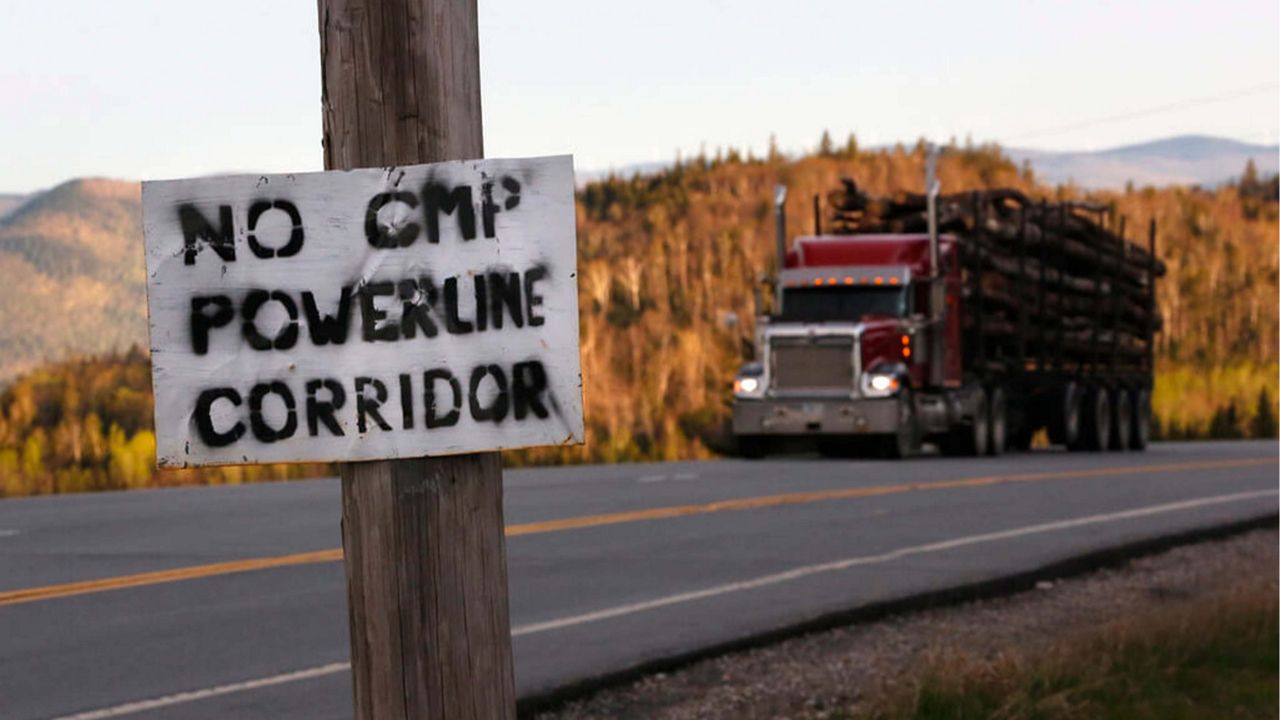A forum Thursday on the upcoming statewide vote on the future of Central Maine Power’s controversial transmission line devolved at times into a testy debate with little clarity between opinion and fact.
Maine voters will decide next month on ballot question 1, which would retroactively block the 145-mile Canadian hydro-powered line from being built in Western Maine — though construction is already underway. The referendum would also require two-thirds legislative approval for future, similar projects, and ban them altogether in the Upper Kennebec region.
An exclusive Spectrum News Maine/Ipsos poll in September found that 50% of registered Maine voters oppose the project, and 34% support it. The data also suggests Democrats remain more split on the project than Republicans and independents.
More than 100 people watched the Lincoln County Democratic Committee forum on the issue online Thursday night. The group has not taken a public position on the project and said the event was intended to be nonpartisan. The Lincoln County GOP has not indicated plans to host a similar event, but their chair Joe Grant recently penned an op-ed in support of the corridor.
A poll taken with Zoom before Thursday’s forum indicated that 55% of viewers were undecided. When polled again after the conversation, only 25% were. The Lincoln Democrats declined to share a more detailed breakdown of the audience’s opinions on the project.
Arguing for question 1, and against the CMP corridor, were Sandra Howard, a Maine recreation guide who leads anti-corridor groups that she describes as grassroots, and Becky Bartovics, the volunteer leader of Maine’s Sierra Club chapter.
They cast the project as a catastrophic environmental disruption that will disincentivize other, more effective energy developments to fight climate change while harming Maine’s outdoor recreation tourism industry.
“These are regions that are not having that industrialization or commercial exploitation. We want to keep it that way,” she said. “If you think about taking a product that you're trying to draw people to, and you degrade it or cause irreparable harm — you're damaging that product which is really Maine's brand. People come from all over the world to see this region.”
Bartovics’ argument focused heavily on the impact in Canada of the hydropower that will supply electricity to the line. She said it will prompt generator HydroQuebec to build more large-scale dams, harming ecosystems and First Nations indigenous communities in Canada.
“If we vote no, we are saying it's OK to destroy their lives,” Bartovics said. “(Hydro-Quebec) have not been good neighbors before, and they're not going to be good neighbors later. They are taking a lot of money out of our economy, and they are providing power to Massachusetts.”
Project supporter and “no on 1” panelist Lincoln Jeffers — the economic development director in Lewiston, which hosts the substation where the transmission line will join the New England-wide power grid — argued that everyone in the region will benefit from an influx of renewable energy. And he stressed that the project has already received a raft of approvals from Maine regulators.
“This is not the sort of project that should be determined in a public forum. It should not be subject to politics,” Jeffers said. “It should really be evaluated on its merits.”
But those merits are still a contentious subject. Panelists offered conflicting claims on the project’s costs and benefits to climate change, Maine’s economy and other energy businesses.
They agreed, for instance, that the corridor will cut through working forest in a region with an active logging industry. Howard said this was a preferable activity to the corridor’s construction, while Jeffers argued it meant the project’s route was not as pristine as opponents claimed.
Howard claimed that New Hampshire had rejected a similar project to CMP’s — Eversouce’s Northern Pass, which preceded CMP in a deal with Massachusetts — because they found it would have no emissions benefits. In fact, New Hampshire rejected the project because regulators determined it would interfere with orderly development, which Dudley pointed out.
It’s an example of how facts surrounding the issue and the basics of the CMP project have been increasingly overshadowed by political rhetoric on both sides, with tens of millions in spending on the ballot measure to date, national scrutiny and more legal battles to follow regardless of the outcome in November.
The project has been litigated largely in opinion pieces and letters to the editor, direct mailings and scores of television ads, with few public debates held so far, though the Bangor Daily News hosted one shortly before the Lincoln Democrats event.
The other “no on 1” debater was Ben Dudley, a longtime Democratic political operative in Maine who now leads the pro-corridor group Mainers for Clean Energy Jobs. He was the only panelist to spend most of his time discussing the ballot referendum rather than just the corridor itself.
“This notion of retroactivity included in this kind of legislation violates the rules of basic fairness found on every playground. You don't change the rules in the middle of the game, let alone when the game is over,” he said. “There's no precedent for retroactive laws being passed after a billion-dollar construction project is months into operation and employing hundreds of Maine workers.”
He argued that the referendum would complicate future efforts to grow renewable energy in Maine, and said big fossil fuel companies that own gas-fired power plants in Maine and a nuclear plant in New Hampshire have poured money into the “yes on 1” campaign.
Sandra Howard acknowledged that, but said CMP and its allies have outspent her side by far.
“It's a David and Goliath situation, and I've always said we welcome the help,” she said. “I'm so glad we have folks and coalition partners from … major environmental organizations. Are other utilities against this project, too? Yes — that's for their own interests. We may have various reasons that we oppose the corridor, but we all want the same end game: to vote ‘yes on one.’"





